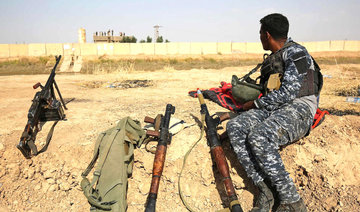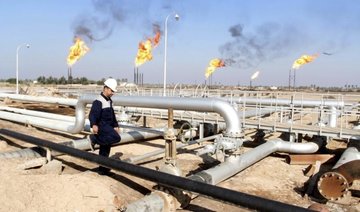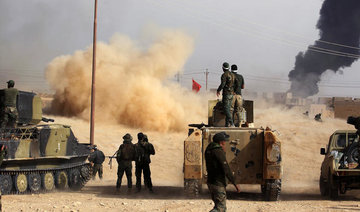AL-HAMZA: In the shadow of the Imam Hamza mosque in the region of the ancient kingdom of Babylon, a carpet market that was once bustling is now almost empty.
The only visitor to Hamad Al-Soltani’s small shop in the city of Al-Hamza in central Iraq, some 175 km south of Baghdad, is a local tribal chief.
Nothing in the world can convince Sheikh Hazem Al-Hiyali — a Bedouin scarf on his head, hooded cloak over his shoulders and shawl on his neck — to replace the traditional carpets he receives his guests on for imported versions.
Over the past few years, Iraq has been flooded with carpets from abroad — but although they may well be much cheaper they are of a far lower quality, he insists.
Hiyali says he cannot bear to even imagine his “diwan,” the traditional reception room where visitors sip tea and chat, without the long rectangular carpets adorned with geometric patterns.
“It is by the beauty of its carpets that one can judge a room,” he tells AFP, running ring-covered fingers across the merchandise hanging on the walls of the shop.
“Our mothers and our grandmothers worked at home to weave” these carpets, says the tribal leader, his beard speckled with grey.
Soltani, 32, inherited his carpet shop from his father.
He says older generations of women also embroidered saddles for camels and wove covers for their harnesses, but such items are sold nowadays only as decorations.
Mehdi Saheb spent 50 years working at a loom and can speak for hours about the rich history and intricacies of carpet manufacturing in Iraq.
As he talks, Saheb, 70, weaves in long-forgotten words from the past that are now unfamiliar to younger Iraqis.
Inherited from the Turkish used during Ottoman era more than a century ago, they describe the different colors and types of wool used in this agricultural area where keeping livestock is widespread.
“Before, people came from abroad to place orders,” he says, wearing a beige robe as he sits in his small house on the verge of a dusty road.
By “before,” Saheb means before the 2003 US-led invasion of Iraq that sparked chaos and bloodshed which still roils the country.
“Every day, some twenty groups of tourists would come to visit the ancient sites” of Babylonia and other archaeological treasures, recalls former antiquities official Fallah Al-Jabbawi.
Now no tourists come to see this millennia-old heritage.
“There are only Iraqis left,” laments Saheb, who throughout his working life embroidered patterns passed down from the different civilizations that once ruled this region.
Circles, squares, and stylized animals or flowers: The symbols woven into Iraq’s carpets can be traced back to the Babylonians who ruled there some 2,000 years before Christ was born, or the Assyrians who followed.
Meanwhile, certain motifs are said to be Islamic.
In many houses, families jealously guard carpets passed down from their ancestors, while the offices of senior government officials or foyers of luxury hotels are often decorated with the traditional goods.
But on the markets, the majority of new models being purchased are now mass-produced in neighboring Iran, Turkey or Syria.
About half as cheap as their Iraqi equivalents, the imports have slowly but surely made their way onto the stalls.
Shopkeeper Soltani still has carpets on display that are more than 50 years old, but he struggles to sell many of his wares.
An item that he once could have got more than $100 for, he now has to let go for just $20, he says.
In the rutted streets of the old neighborhood nearby, the impact of the industry’s decline can be seen.
Some 30 or 40 families who once made their living from weaving now struggle to scratch together $100 each month.
Traditional carpet weaving in central Iraq unravels
Traditional carpet weaving in central Iraq unravels

Iran foreign ministry affirms support for Syria’s sovereignty

- Assad fled Syria earlier this month as rebel forces led by the Sunni Islamist group Hayat Tahrir Al-Sham (HTS) entered the capital Damascus
Tehran: Iran affirmed its support for Syria’s sovereignty on Monday, and said the country should not become “a haven for terrorism” after the fall of president Bashar Assad, a longtime Tehran ally.
“Our principled position on Syria is very clear: preserving the sovereignty and integrity of Syria and for the people of Syria to decide on its future without destructive foreign interference,” foreign ministry spokesman Esmaeil Baqaei said in a weekly press briefing.
He added that the country should not “become a haven for terrorism,” saying such an outcome would have “repercussions” for countries in the region.
Assad fled Syria earlier this month as rebel forces led by the Sunni Islamist group Hayat Tahrir Al-Sham (HTS) entered the capital Damascus after a lightning offensive.
The takeover by HTS — proscribed as a terrorist organization by many governments including the United States — has sparked concern, though the group has in recent years sought to moderate its image.
Headed by Ahmed Al-Sharaa, Syria’s new leader and an ardent opponent of Iran, the group has spoken out against the Islamic republic’s influence in Syria under Assad.
Tehran helped prop up Assad during Syria’s long civil war, providing him with military advisers.
During Monday’s press briefing, Baqaei said Iran had “no direct contact” with Syria’s new rulers.
Sharaa has received a host of foreign delegations since coming to power.
He met on Sunday with Turkish foreign minister Hakan Fidan, and on Monday with Jordan’s top diplomat Ayman Safadi.
On Friday, the United States’ top diplomat for the Middle East Barbara Leaf held a meeting with Sharaa, later saying she expected Syria would completely end any role for Iran in its affairs.
A handful of European delegations have also visited in recent days.
Regional powerhouse Saudi Arabia, which has long supported Syria’s opposition, is expected to send a delegation soon, according to Syria’s ambassador in Riyadh.
Iran says ‘no direct contact’ with Syria rulers

- Foreign ministry spokesman: ‘We have no direct contact with the ruling authority in Syria’
TEHRAN: Iran said Monday it had “no direct contact” with Syria’s new rulers after the fall of president Bashar Assad, a longtime Tehran ally.
“We have no direct contact with the ruling authority in Syria,” foreign ministry spokesman Esmaeil Baqaei said at a weekly press briefing.
Jordan foreign minister holds talks with Syria’s new leader

- It was the first visit by a senior Jordanian official since Bashar Assad’s fall
AMMAN: Jordanian Foreign Minister Ayman Safadi met with Syria’s new leader Ahmed Al-Sharaa in Damascus on Monday, Amman said, the latest high-profile visit since Bashar Assad’s ouster.
Images distributed by the Jordanian foreign ministry showed Safadi and Sharaa shaking hands, without offering further details about their meeting.
A foreign ministry statement earlier said that Safadi would meet with the new Syrian leader as well as with “several Syrian officials.”
It was the first visit by a senior Jordanian official since Assad’s fall.
Jordan, which borders Syria to the south, hosted a summit earlier this month where top Arab, Turkish, EU and US diplomats called for an inclusive and peaceful transition after years of civil war.
Sharaa, whose Islamist group Hayat Tahrir Al-Sham (HTS) spearheaded the offensive that toppled Assad on December 8, has welcomed senior officials from a host of countries in the Middle East and beyond in recent days.
Jordanian government spokesman Mohamed Momani told reporters on Sunday that Amman “sides with the will of the brotherly Syrian people,” stressing the close ties between the two nations.
Momani said the kingdom would like to see security and stability restored in Syria, and supported “the unity of its territories.”
Stability in war-torn Syria was in Jordan’s interests, Momani said, and would “ensure security on its borders.”
Some Syrians who had fled the war since 2011 and sought refuge in Jordan have begun returning home, according to Jordanian authorities.
The interior ministry said Thursday that more than 7,000 Syrians had left, out of some 1.3 million refugees Amman says it has hosted.
According to the United Nations, 680,000 Syrian refugees were registered with it in Jordan.
Jordan in recent years has tightened border controls in a crackdown on drug and weapon smuggling along its 375-kilometer border with Syria.
One of the main drugs smuggled is the amphetamine-like stimulant captagon, for which there is huge demand in the oil-rich Gulf.
Israeli airstrikes on Gaza kill at least 20 people, Palestinian medics say

- Israel’s air and ground offensive has killed over 45,200 Palestinians, according to Gaza’s Health Ministry till date
Palestinian medics say Israeli airstrikes on the Gaza Strip have killed at least 20 people.
One of the strikes overnight and into Monday hit a tent camp in the Muwasi area, an Israel-declared humanitarian zone, killing eight people, including two children. That’s according to the Nasser Hospital in the southern city of Khan Younis, which received the bodies.
Hospital records show another six killed in a strike on people securing an aid convoy and another two killed in a strike on a car in Muwasi. One person was killed in a separate strike in the area.
The Al-Aqsa Martyrs Hospital in the central city of Deir Al-Balah said three bodies arrived after an airstrike on a school-turned-shelter in the built-up Nuseirat refugee camp.
The Israeli military says it only strikes militants, accusing them of hiding among civilians. It said late Sunday that it had targeted a Hamas militant in the humanitarian zone.
The war began when Hamas-led militants attacked southern Israel on Oct. 7, 2023, killing some 1,200 people, mostly civilians, and taking around 250 hostage. Around 100 captives are still inside Gaza, at least a third of whom are believed to be dead.
Israel’s air and ground offensive has killed over 45,200 Palestinians, according to Gaza’s Health Ministry. The ministry says women and children make up more than half the dead but does not distinguish between civilians and combatants in its tally. The military says it has killed over 17,000 militants, without providing evidence.


















